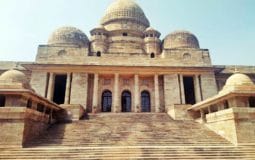Political observers are keen to see if the BJP will now be guided by its more firmly entrenched ideological dominance in picking a face solidly identified with its core planks, or if it will choose a person tilted more to its electoral calculations. Or, whether its pick will be an ode to its core supporters or a outreach to relatively new groups of votaries.
With the Election Commission on Thursday setting the ball rolling for the election of the new President, all eyes are now on who will be the Bharatiya Janata Party’s choice for the top constitutional post as the party with the support of its allies has a clear advantage over the opposition in any likely contest.
For all practical purposes, it is not which alliance’s candidate will win the poll but who will be its choice, is the overriding aspect of the contest, set for July 18 in case more than one person is in the fray.
The BJP’s empathic win in four assembly polls, including in the all-important Uttar Pradesh where the value of vote of each MLA is more than any other state, has only added to its overall advantage.
Though the BJP and its allies in the National Democratic Alliance have fewer MLAs than they had during the 2017 presidential polls, the number of their MPs has gone up since.
A BJP leader said the ruling NDA already has close to 50 per cent of votes in the electoral college. The alliance is hopeful of getting support from independent regional parties like the ruling YSR Congress Party in Andhra Pradesh and the incumbent Biju Janata Dal in Odisha.
The BJP is also counting on support from All India Anna Dravida Munnetra Kazhagam, its ally in the last Tamil Nadu assembly polls.
The BJP had sprung a surprise by picking then Bihar governor Ram Nath Kovind, a leader from Dalit community who had been a low profile member of the party, as its choice for the top position in 2017.
Its leadership has made a knack of often picking less-heralded persons while keeping an eye firmly on the wider political import of its choice.
The choice of Kovind, never really associated with the Hindutva plank even while being a party loyalist, was then seen to hew nicely with its ambitious drive to win over the disadvantaged community he came from, and the successive polls have shown that it has been successful to a large extent in wining over the key segment of votes.
Political observers are keen to see if the BJP will now be guided by its more firmly entrenched ideological dominance in picking a face solidly identified with its core planks, or if it will choose a person tilted more to its electoral calculations. Or, whether its pick will be an ode to its core supporters or a outreach to relatively new groups of votaries.
There has long been speculation that the party may pick a tribal or woman face.
However, the BJP top brass has been known to discard conventional wisdom in its choices.
That it may again go for Kovind remains a possibility but the convention has been that no President, except for Rajendra Prasad, has got two full terms.
BJP sources added that its senior leaders will reach out to all parties, including the opposition, to form a consensus over the choice for the top constitutional position.
According to latest official figures, the BJP on its own has 392 MPs, excluding four nominated Rajya Sabha members who cannot vote, out of the current strength of 772 members from both Houses, giving it a clear majority. Though there are three vacancies in Lok Sabha and 13 in Rajya Sabha as of now, the final tally is unlikely to be drastically changed when they are filled before the presidential polls.
The BJP’s numerical advantage in Parliament, which has almost half of the votes in the electoral college which also comprises all elected MLAs, is further enhanced when the strength of its allies like Janata Dal-United, which has 21 MPs in total, Rashtriya Lok Janshakti Party, Apna Dal and several from the Northeastern states are added.
















